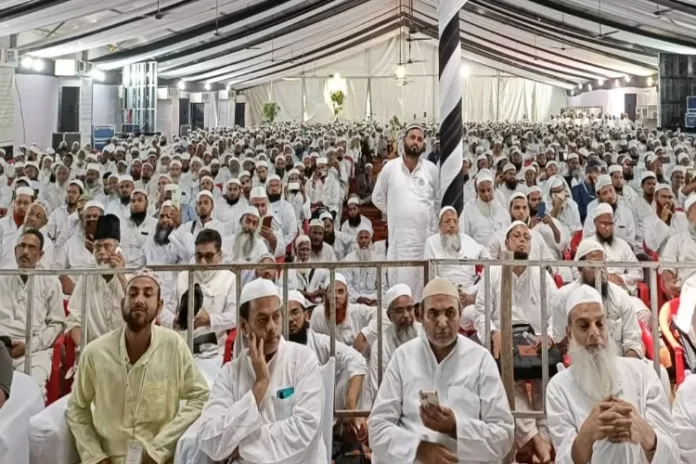– Abdul Bari Masoud
New Delhi, March 29: In the backdrop of growing attacks on Waqf properties and its law, mosques all around the country marked the third Friday of Ramadan as “Awqaf Protection Day” in response to the appeal of Jamiat Ulama-i-Hind, led by Maulana Mahmood Madani. The occasion was used by imams, khatibs, and mosque authorities to emphasize in their sermons the religious, social, and community value of waqf (endowment) and the need to protect these assets for the benefit of the underprivileged.
Around 120 petitions were filed, challenging the Waqf (Amendment) Act 2013 in different courts by people connected with the ruling party. To top it all, a BJP MP also succeeded in introducing a private-member bill in the last session of Rajya Sabha in February that seeks to repeal the Waqf Act.
On the occasion, JUH General Secretary Maulana Hakeemuddin Qasmi gave a moving speech at Masjid Abdun Nabi, at the JUH headquarters here. He highlighted the dangers posed by communal elements to waqf properties in the country.
A JUH statement said, a nationwide commitment to safeguarding waqf properties was made by imams from more than 25000 mosques spread across states like Gujarat, Karnataka, Andhra Pradesh, Telangana, Assam, Kerala, Goa, Haryana, West Bengal, Bihar, Uttar Pradesh, Tamil Nadu, Delhi, and Jharkhand. People have been sworn in to act decisively against any encroachments, unlawful holdings, or unapproved transfers of waqf assets, in compliance with the Government of India and the Waqf Act. They have promised to stand shoulder to shoulder in this attempt, supporting JUH and other waqf protection organizations. They declared that they were willing to support the social boycott of those who take advantage of waqf holdings, emphasizing the significance of upholding the endowment’s objectives.
The worrisome reality of many waqf properties being sold off at exorbitant rates as a result of negligence and indifference is also addressed by imams in their sermons. Muslims have frequently been held accountable for the misuse of these properties, with the basic goals of the waqf being overlooked in favor of individual benefit. The issue has been worsened by widespread encroachments by powerful organizations, including government agencies and commercial businesses; thousands of waqf properties are currently occupied.
There are reportedly 10,000 waqf properties in the country that are occupied by different organizations, while the Sachar Committee report indicates that there may be as many as five lakh endowment properties. It is shocking to learn that a scam involving over Rs. 2 lakh crore occurred in Karnataka alone, highlighting the urgent need for coordinated action to safeguard these priceless assets. A startling 70% of the Rs. 55,000 crore value of waqf holdings in Madhya Pradesh have been embezzled. Similar cases of unauthorized occupation have been documented in several provinces, including Andhra Pradesh, demonstrating how widespread the problem is.
In the given situation, Jamiat said, the Muslim community has a responsibility to actively participate in the waqf protection effort. “We can guarantee these endowments’ proper use for the advancement of society by promoting awareness of them and fighting for their preservation,” it added.




